






Read about ‘Reasons for Moving’ on page 8.
By Al Brown Assignment Editor
s fireworks sizzle in the night sky and proud waves of red, white, and blue banners decorate the streets, the United States celebrates Independence Day. For most, it is a time of historic joy, reveling in the storied past of a young nation’s fierce resolve for freedom from colonial rule.
But for many African Americans, July 4 often carries a weight of reflection and critical introspection—a reminder of an unfulfilled promise and a stark acknowledgment of a nation’s ongoing struggle with its inclusive ideals, wrestling for white freedom but synchronizing efforts to further dehumanize Indigenous Natives and those of African descent brought here by force to exploit their labor.
As quoted and written countless times, the core of America’s Declaration of Independence is its clarion call
for “Life, Liberty, and the pursuit of Happiness,” an inspiring doctrine that envisioned a land where all men were equal and free from tyranny. Yet, history paints a starkly different picture of African Americans. From chattel slavery to the Jim Crow era and from the civil rights struggle to the systemic inequities still pervading our society in 2024, the journey to equality and inclusion has been fraught with profound and enduring obstacles.
At the heart of this harsh and shameless crudeness lies the brutal truth that the inception of American independence did not include Black lives within its emancipatory promise. While white Americans celebrated their freedom from British rule, African people were shackled in chains, brutally subjugated, and considered mere property. For over 500 years, the shadow of this historical injustice has lingered, casting an “otherworldly weight” upon African Americans, an indelible albatross
tied to the pursuit of their true independence.
Even today, the disparities between whites and nonwhites are glaring and deeply embedded within the fabric of our political, religious, economic, and social systems. From biased policing and racial profiling to wage gaps, disparities in education, and barriers to health care, the echoes of systemic racism resonate across every facet of life. The dream of an America where everyone truly enjoys equal opportunity, and rights remains elusive—more so for the Black community, which continues to bear the brunt of these systemic inequalities.
It’s a bitter reality that, for every step forward, African Americans have had to fight.
From the Civil Rights Movement led by Dr. Martin Luther King Jr., which sought to eradicate segregation and secure voting rights, to the more recent Black Lives Matter movement, which protests against
■ See INDEPENDENCE on page 4
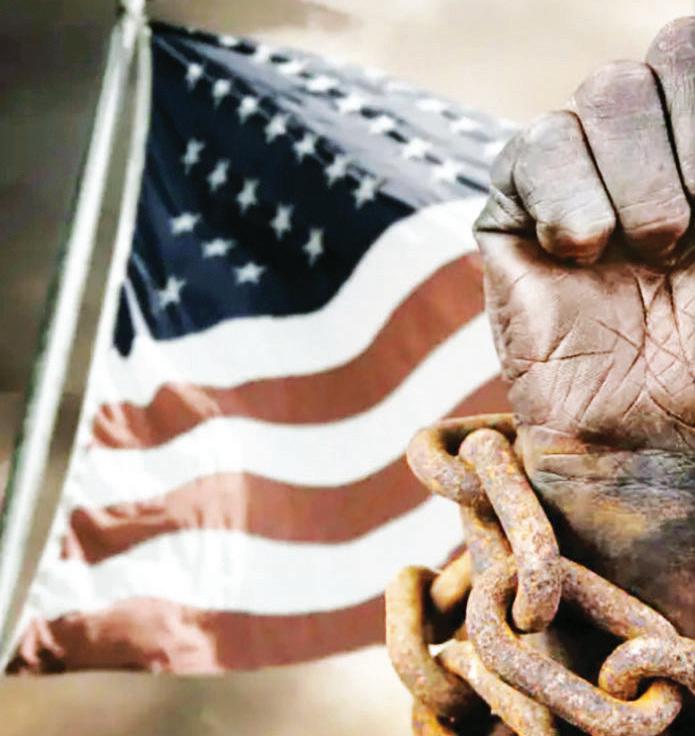
sist in society.
Publication date: February 22nd, 2001
By Al Brown Assignment Editor
pike Moss Way, a street in North Minneapolis, will be named after the longtime activist on July 16. Moss graciously acknowledges this recognition, highlighting its significance as a form of reparation for his challenges while advocating for justice. Reflecting on his journey as an activist, Moss acknowledges the criticisms and vilification he has endured for speaking out against systemic injustices. Addressing the impact of recent events like the tragic murder of George Floyd, Moss emphasizes the importance of this honor as a symbol
By MSR News
ast week on Juneteenth, ahead of the Saint Paul Saints game against the Toledo Mud Hens in the second game of their six-game series, Minnesota SpokesmanRecorder’s Associate Editor Abdi Mohamed threw out one of the opening pitches to start the game.

of progress and acknowledgment of his lifelong dedication to social justice.
He also pays tribute to Launa Q. Newman, the late publisher of the Minnesota Spokesman-Recorder. “Mrs. Newman provided me with a platform to amplify my voice and counter the narratives of detractors when no one else did. I truly believe her efforts helped save my life. For that, I’m forever indebted and thankful,” Moss explained.
In a poignant statement about Independence Day and its relevance to the Black community, Moss draws parallels between the nation’s fight for independence and the ongoing struggles faced by African Americans.
The Saints, a Minor League Baseball team and the TripleA affiliate of the Minnesota Twins, invited MSR to throw the opening pitch in celebration of Juneteenth and in recognition of the 90th-anniversary milestone the paper is celebrating.
As Mohamed walked up to the mound to take his pitch, the announcer took to the mic and invited Saints fans to donate 90 dollars to celebrate 90 years of continuous publishing.
The organization also commemorated the life of Willie Howard Mays Jr., a hall-of-fame baseball player who started off in the Negro League before joining Major League Baseball in 1951. The day was celebrated as the Saints recognized individuals and organizations from the Black community on Juneteenth for their contributions to the community.
The Saints won the game and the rest of their series against the Mud Hens.
For more MSR news, visit spokesman-recorder.com.

He highlights the disparity of a tax system that fails to provide reparations for the historical injustices endured by Black Americans, pointing out the continued inequities that per-
Along the way, Moss has overcome a lot, like being shot at repeatedly by those trying to stop his activism. “I was shot at nine different times but never cried out because I was cautious never to expose any weakness in my armor. So, I always acted as if everything was okay with me. Again, even though this is great, even greater was [that] during these times, the Spokesman-Recorder let me tell my truth, or they would have stopped me way back in the day,” he said.
Throughout his activism, Moss remains focused on the well-being of his people, emphasizing the importance


n this week’s MSR 90th Anniversary countdown Historic Time Capsule, we revisit the culturally notable Rondo Neighborhood’s vibrant African American community in St. Paul before the I-94 construc-
tion in the 1960s. The extreme uprooting displaced many families of color, their homes, businesses, and community, fracturing a close-knit neighborhood. Despite this, Rondo’s legacy and community unity endures continually and through events like Rondo Days, an annual celebration recognizing the strength and commitment to maintaining the fabric of this long-standing community. Former residents shared personal stories, recapping the neighborhood’s rich cultural and social life and the ongoing impact of its loss.
To read more about this historic event and others, visit our website www.spokesman-recorder.com.
Mpls health commissioner focuses on substance abuse, racial equity, climate His own experience with deep poverty informs his work
By Tony Kiene Staff Writer
career in professional football is what Damōn Chaplin had in mind when he matriculated to Norwich University, a private senior military college located in Northfield, Vermont. An injury ended those dreams, but the Boston native wasn’t deterred. When he transferred to Central State University in Wilberforce, Ohio, to study biology, it was “all about academics.”
Chaplin became the first member of his family to graduate from a four-year institution. Today, he is the commissioner of the Minneapolis Health Department, a position he was nominated for and confirmed to in 2023 after having distinguished himself as the director of health for the city of New Bedford, Massachusetts. That said, a career in public health was not something Chaplin
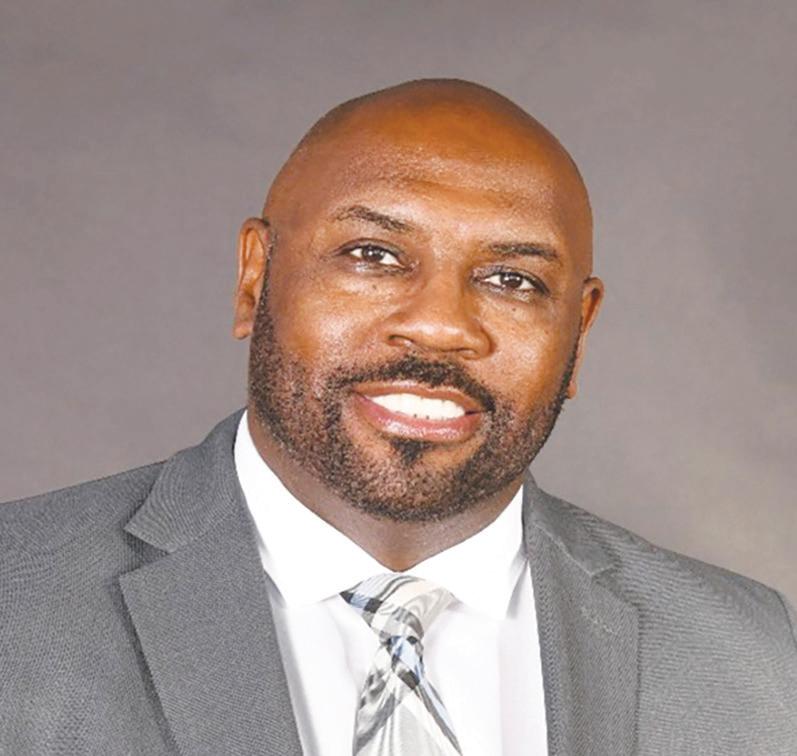
ever envisioned for himself, at least not early on.
“I spent 15 years trying to get out of public health,” he says, noting that his initial
foray into health or environmental work of any sort was in 1995 as a naturalist with Cleveland Metroparks. When his father fell ill in
1999, Chaplin returned home to Boston, landing a job with the city’s Public Health Commission, where he worked on the issue of lead abatement. In 2004, his father passed away at the age of 54; a little more than a decade later, Chaplin’s mom died at only 64 years of age.
“My parents left this world before their time,” observes Chaplin, “So, I started to think more honestly about my own life, my health.”
Coming of age in the projects, Chaplin struggled with asthma and was rushed to the local emergency room on several occasions. When he reflected on all the environmental hazards that disparately affect communities like the one he grew up in—be it an open incinerator on the premises, the precarious chemicals frequently used in pesticides, or any other detrimental health
By Rachana Pradhan and Fred Clasen-Kelly KFF Health News
U.S. Surgeon General Vivek Murthy declared firearm violence a public health crisis as gun deaths and injuries punctuate daily life in America. On nearly every day of 2024 so far, a burst of gunfire has hit at least four people somewhere in the country. Some days, communities have endured four or five such shootings.
The nation’s top doctor called on policymakers to consider gun safety measures such as bans on assault weapons and high-capacity ammunition magazines and universal background checks for all firearm purchases. His advisory also urges a “significant increase” in funding for research on gun injuries and deaths, as well as greater access to mental health care and trauma-informed resources for people who have experienced firearm violence.
In 2022, more than 48,000 people were killed by guns in the U.S., or about 132 people a day, and suicides accounted for more than half of those deaths, according to data from the Centers for Disease Control and Prevention. An additional 200-plus Americans seek emergency care for fire
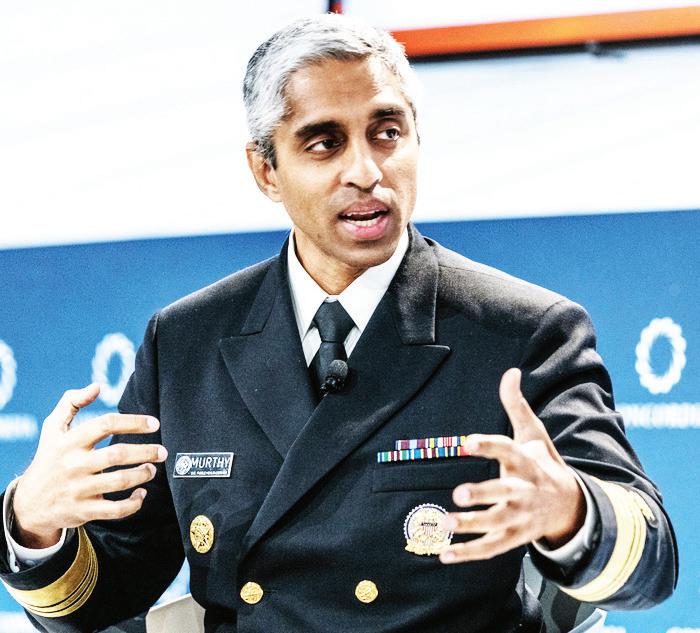
out gun policy, but historically its reports and warnings have nudged policymakers and lawmakers to act.
Murthy, a physician, told KFF Health News he hoped to convey the broader toll of gun violence on the nation and the need for an urgent public health response. He cited soaring gun deaths among children and teens and noted that “the mental health toll of firearm violence is far more profound and pervasive than many of us recognize.
“Every day that passes we lose more kids to gun violence,” Murthy said. “The more children who are witnessing
over the past two decades have driven the sharp rise in gun deaths, the advisory says.
Guns are the leading cause of death for children and teens, with higher death rates among Black and Hispanic youths.
Researchers from Boston University found that during the height of the Covid pandemic, Black children were 100 times as likely as white children to experience gun injuries. Hispanic and Asian children also saw major increases in firearm assault injuries during that time, that study showed.
Joseph Sakran, executive vice chair of surgery at John Hopkins Hospital in Baltimore
stop here. We have to use this as another step in the right direction. No one wants to see more children gunned down.”
Murthy has long said gun violence should be framed as a health issue. He argued that the approach has been successful in combating significant societal problems, citing tobacco control efforts that took hold following the thensurgeon general’s landmark 1964 report concluding that smoking cigarettes causes lung cancer and other diseases.
“We saved so many lives, and that’s what we can do here, too,” Murthy said.
Murthy’s move is one of several recent Biden administration actions designed to combat gun violence, as most gun-related measures remain political nonstarters in Congress. While available data points to tragic outcomes across American communities, government
officials and public health researchers have long been stymied by sparse federal fund
ing devoted to gun violence research and the scope of its health effects.
“As we look at firearm injuries, there’s arguably no public issue as urgent.”
“I’ve been studying gun violence for about 33 years now, and there are still some really basic and fundamental questions I can’t answer,” said Daniel Webster, a gun violence researcher at Johns Hopkins University.
“To understand gun violence, you need to do more than just look at publicly available surveillance data,” he said. “You need to do in-depth studies


involving the populations at highest risk for shooting or being shot.”
A Brady analysis found that of the 15 leading causes of death in the U.S., firearm injuries received the thirdlowest amount of federal research funding through the National Institutes of Health for each person who died. The only causes of death that garnered less research funding through NIH were poisonings and falls, according to the analysis.
Over a decade ago, former President Obama nominated Murthy as the nation’s top doctor. But Murthy’s support for a federal ban on the sale of assault weapons and ammunition and additional restrictions on gun purchases drew the ire of the National Rifle Association, as well as Republicans and some Democrats in Congress. The U.S. Senate narrowly confirmed Murthy to the job in December 2014, more than a year after his nomination.
Webster said that many other causes of death are treated differently in terms of understanding the problems and developing solutions. But “that’s generally not what we’ve done with gun violence. We’ve oversimplified it and overpoliticized it.”



MSR would like to recognize the ongoing support from community businesses and nonprofit organizations, by extending a special invitation to celebrate 90 continuous years of publishing with us. Share an elegant evening with friends, family or colleagues at this formal affair commemorating MSR's noteworthy milestone at the iconic Renaissance Minneapolis Hotel, The Depot, located in the heart of downtown Minneapolis’ Mill District.
Experience a one of a kind, walk thru historic photo exhibit and a grand gala that recalls the MSR 90 year legacy that reflects almost a century of events around our local and national community. The evening also features theatrical and musical entertainment, esteemed guests like MPR President Duchesne Drew, and emcee, MPR correspondent, Angela Davis. Your generous contribution of $1000 for five tickets as a "Community Supporter" also secures the name of your organization in a highlighted section of the newspaper and will also be mentioned at the event.
To secure five Community Supporter tickets for $1000, fill out the section below or visit our website at MSR by clicking the UR code. (Additional tickets are available). I’M A MSR COMMUNITY SUPORTER!



By Binta Kanteh
Between Thursday, June 13th, and Saturday, June 15th, a national gathering rooted in the principles of coming together to prosper together took place in Minnesota’s Capital. The National Conference on Black Cooperative Agenda was in St. Paul as the city prepared to ascend to an ambitious goal decreed by Mayor Melvin Carter for Saint Paul to one day be the cooperative capital of the county.
From California to New York and several states in between, the country was well represented in the Union Depot.
Christina Nicholson, the Cooperative Finance Developer for the Worker-Owner Initiative at Nexus Community Partners, shared her considerations in choosing a site for the conference.
“We chose Union Depot for a couple of reasons: our organization has a relationship with Saint Paul, and we’ve partnered on a $2.5 million grant to do cooperative development in the next three years. Another reason is that Union Depot has a deep relationship with Rondo [neighborhood] and the Black community here in Saint Paul.
With the local leadership and insight of Nexus Community Partners, the organization behind the conference- Network for Developing Conscious Communities (NDCC) was able to pull off the three-day event brimmed with 18 sessions that covered topics concerning the
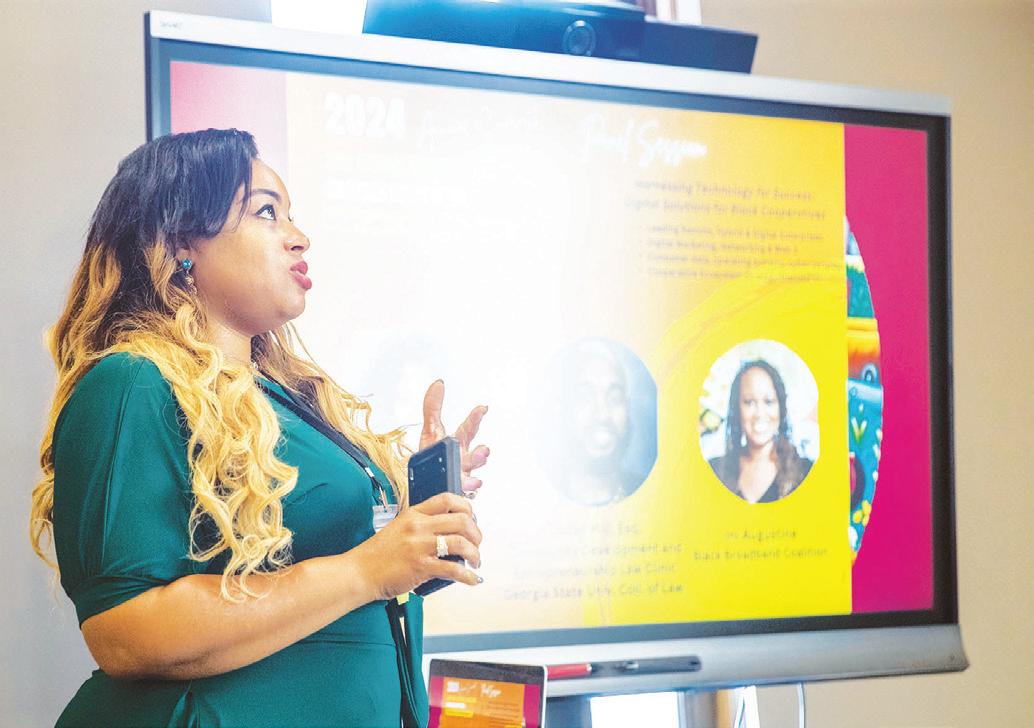
history of cooperatives, best practices in navigating the structure of cooperatives, and the connection between cooperatives and overarching social, political, and economic truths of the country.
The conference’s opening plenary was commenced by the founder of NDCC, Ron Hantz, President and CEO of Nexus Community Partners Repa Mekha, Youthprise President Marcus Pope, and Columinate Consultant LaDonna Sanders Redmond. Moderated by Nexus’s Danielle Mkali and American Sign Language interpretation led by Valerie Shirleyit was clear from the tone the opening session was meant to ground visitors and locals alike in why cooperatives have and continue to matter.
Each panelist spoke to the interconnected nature of cooperatives and movements centered on countering violent, exclusionary, and oppressive forces. Sanders Redmond be
gan the conversation by naming the connection between Ida B. Wells’s anti-lynching endeavor and the People’s Grocery lynchings of 1892.
From the session, we learned that the burgeoning resurgence of Black cooperatives requires incorporating the needs and voices of the youth, a population that perpetually challenges the status quo. Pope shared here that Youthprise is working to create a housing cooperative.
Expressions of Cultural and Spiritual Dimensions felt like a natural follow-up. In addition to other themes in this session, the term Ubuntu—“I am because we are”—was discussed in perhaps the most comprehensive way I have ever known. Session panelist Tamah Yisreal explained that Ubuntu is “the foundation for
Legality of Forming a Cooperative. In an impressive 90 minutes, the discussion spelled out how being familiar with your state’s laws for cooperative structures is imperative to help define and protect your intentions and goals to form a cooperative.
On the second day, Mayor Melvin Carter didn’t hold back in illustrating why cooperatives are incubators of equity, not the amorphic spirit of equity but the actual distribution and accumulation of wealth needed for people to pursue well-being and self-determination. “There is nothing more expensive in this country than being poor in this country,” he said.
Conference attendees from outside Minnesota were especially impressed when they learned about Saint Paul’s guaranteed basic income pilot and Inheritance Fund.
Harnessing Technology for Success: Digital Solutions for Black Cooperatives, led by a panel that included Ini Augustine, presented the various
and surprisingly extensive list of digital tools to help a cooperative’s ability to succeed.
“There is nothing more expensive in this country than being poor in this country.”
Augustine cautioned cooperatives to consider the context of surveillance, which often targets the Black diaspora when implementing new digital tools.
One of the last afternoon sessions for the conference on Sustainable Cooperative Food Sourcing and Supply Chain featured Somali American Farmers Association Director Naima Dhore and Carl Johnson of Storehouse Grocers and Coffee. Dhore and Johson shared their experiences building cooperatives in Minnesota’s food and agriculture sector.
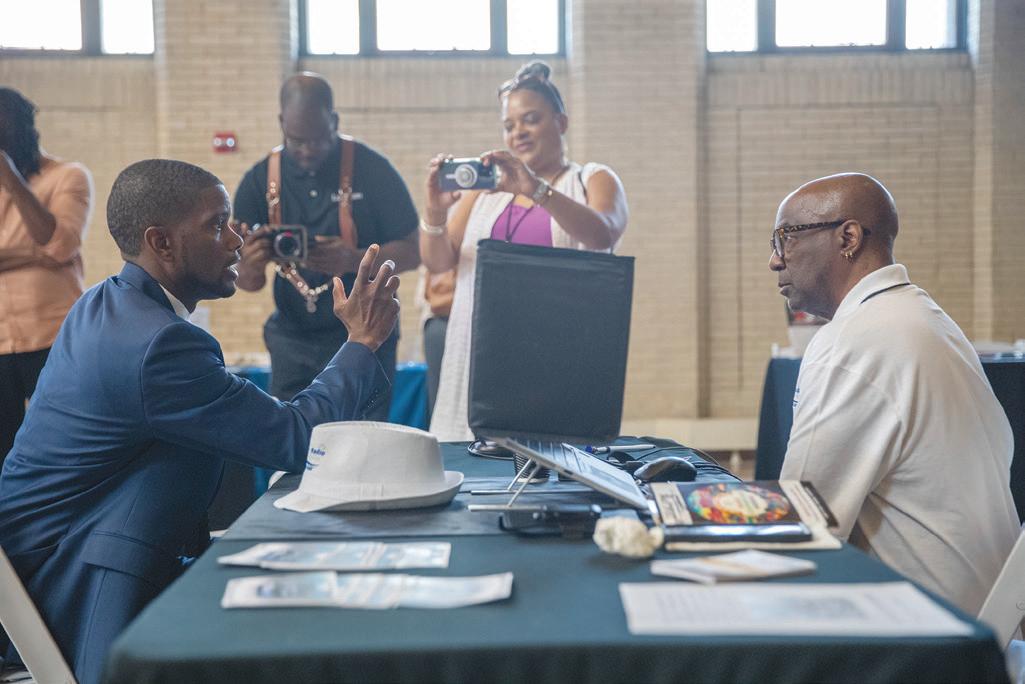

When the mic was turned to the audience for open dialogue, Alicia Jones, an attendee who calls both Baltimore and Harlem home, shared, “The thoughtfulness of this conference was phenomenal.”
Zoë Bourgerie attended with curiosity to learn more about community ownership of assets like businesses, housing, and cultural anchors. “I learned that many cooperatives are born out of many community members wanting to provide better service or resources in their community,” Bourgerie shared.
“Leaving from this conference, I feel validated in how to move from individual projects to sustainable and impactful work that we can do together. I’ve made a lot of connections and have many resources to dig into.”
To learn more about The National Conference on Black Cooperative Agenda, contact NDCC ndccinfo@ndccnetwork.org or Nexus Community Partners info@ nexuscp.org to get connected.
Binta welcomes reader comments at bkanteh13@gmail.com.
In our business profile on Arise Medical & Wellness, which ran on June 27, we erroneously quoted Dr. Nana Wilmot-DeSouza as having Kenyan lineage. Her correct lineage is Ghanaian.




police brutality and systemic racism, Black Americans have continuously struggled to reclaim their rightful place in the society they helped to build. Yet, acceptance often translates to tolerating African Americans only in limited capacities, frequently relegating them to menial roles while denying them access to true equality and power.
The disparities today tell the story: African American unem-
ployment rates are significantly higher than those of their white counterparts; Black households possess substantially less wealth than white households; and African Americans are disproportionately adversely affected by the criminal justice system. This isn’t an ancient relic of a bygone era; these are contemporary America’s raw, harsh realities.
A call for reparative justice
Expecting African Americans to fully embrace independence celebrations may be a bridge too far, as collectively, they’ve never experienced it as their white counterparts.
Continued from page 1 “I would like to see reconciliation and solidarity between Black men and women, recognizing the essential role of mutual support and understanding in creating a stronger and more resilient community.”
Continued from page 1
triggers—a “lightbulb went off.” Now, the public health arena no longer seemed like an occupation to Chaplin but rather “a calling.”
“A small area. A high concentration of people. One way in, one way out. Chronic violence. That was my lived experience,” says Chaplin, “That’s what deep poverty looks like for so many people. And its impact on public health is devastating.”
Working tirelessly to end the cycle of poverty in urban communities is where Chaplin
found both his passion and his purpose. He earned his MBA from Curry College and has continued to hone his vision and leadership skills at the local, state and national levels. With over 25 years in the public health sector, Chaplin has served on numerous councils, committees and coalitions and is the current vice president and president-elect of the National Association of County and City Health Officials (NACCHO). In his role as health commissioner for the city of Minneapolis, Chaplain has put forth three primary areas that his department is addressing: substance abuse, including how this problem impacts homelessness in the city; racial
White America must reckon with the truth that true independence for Black Americans will only come with reparative justice.
Reparations are not merely about monetary compensation; they are about acknowledging
Moss’s
and a
and
a
As he is honored with a
in his
his legacy as an advocate for change and a voice for the marginalized continues to inspire hope and resilience in the face of adversity.
Spike Moss’s unwavering dedication to justice and empowerment serves as a guid-
“Systemic racism continues to impact our city. Systems put in place long ago still run smoothly to the disadvantage of many.”
equity in access to health care and health-related outcomes; and the city’s Climate Legacy Initiative (CLI). As it relates to substance abuse, Chaplin, who served on the Opioid Recover and Remediation Fund (ORRF) Advisory Council to the Massachusetts Secretary of Health and Human Services, understands just how critical it is to get this work right.
the centuries of exploitation and oppression and taking concrete steps to rectify this historical and ongoing injustice. It’s about ensuring that the descendants of those who were forcibly brought to these shores and brutalized for generations receive their capitalistic inheritance —a recognition of the invaluable ancestral contributions to the nation and a commitment to dismantling the systems that continue to oppress their descendants.
In a capitalist society, capital is crucial. Without addressing the economic disparities birthed from the shackles of slavery and perpetuated
ing light for future generations seeking to make a positive impact in their communities.
The street dedication for Spike Moss Way takes place at 11 a.m. in the parking lot at UROC, 2001 Plymouth Avenue, Minneapolis.
Al Brown welcomes reader responses at abrown@spokesmanrecorder.com.
“It’s about harm reduction. Keeping people from dying,” he explains, “but it goes deeper than that. We must design tools and strategies focusing on treatment and long-term recovery and provide resources that reconnect people to their families and communities. And, of course, to prevent future users.”
Likewise, health equity remains a major challenge in Minnesota. Despite its consistent ranking as one of America’s healthiest places, the North Star State continues to maintain some of the largest racial gaps in the nation. And nowhere are these gaps more pronounced than in Minneapolis.
“Systemic racism continues
through systemic racism, African Americans will not achieve true independence until a debt owed by this government is paid. Reparations could mean investment in education, health care, housing, and business opportunities for Black communities—a foundational step towards leveling the playing field and enabling African Americans to pursue their lives, liberty, and happiness.
This July 4th, as the nation dons its celebratory garb and salutes its flag, let us also pause to reflect on the journey still ahead. The fireworks that light up the sky should serve as a reminder of the work that
still needs to be done. True independence will be attained the day America fulfills its long-touted promise to all its citizens inclusively, equitably, and justly. Until then, the call for reparations remains a poignant and powerful symbol—a step toward healing, justice, and true independence for African Americans. It is a call for the nation to finally live up to its creed and, in doing so, kindle the spirit of Independence Day for every American.
Al Brown welcomes reader responses at abrown@spokesmanrecorder.com.


to impact our city. Systems put in place long ago still run smoothly to the disadvantage of many,” says Chaplin, “So, we’ve got to elevate the level of discourse, shine a light on the things we see, the things that we can change. I see myself as a disrupter in that regard.”
The Climate Legacy Initiative, approved by the city council in December 2023, seeks to significantly reduce greenhouse gas emissions and make Minneapolis carbon neutral by 2050 while simultaneously becoming a nationwide leader in green careers.
Finally, as a father of four himself, Chaplin’s other concern is the overall health and







wellness of our children as he and his department strive to make the City of Lakes a place where all of its residents can find health and happiness.
“I think it is vital that we look closer at the impact of social media and how much time our kids spend on the internet and their cell phones. And the implications of all of this.”
For more information on the Minneapolis Health Department and its programs, services and resources, please visit https://www2.minneapolismn. gov/government/departments/ health/.
Tony Kiene welcomes reader responses at tkiene@spokesman-recorder.com.
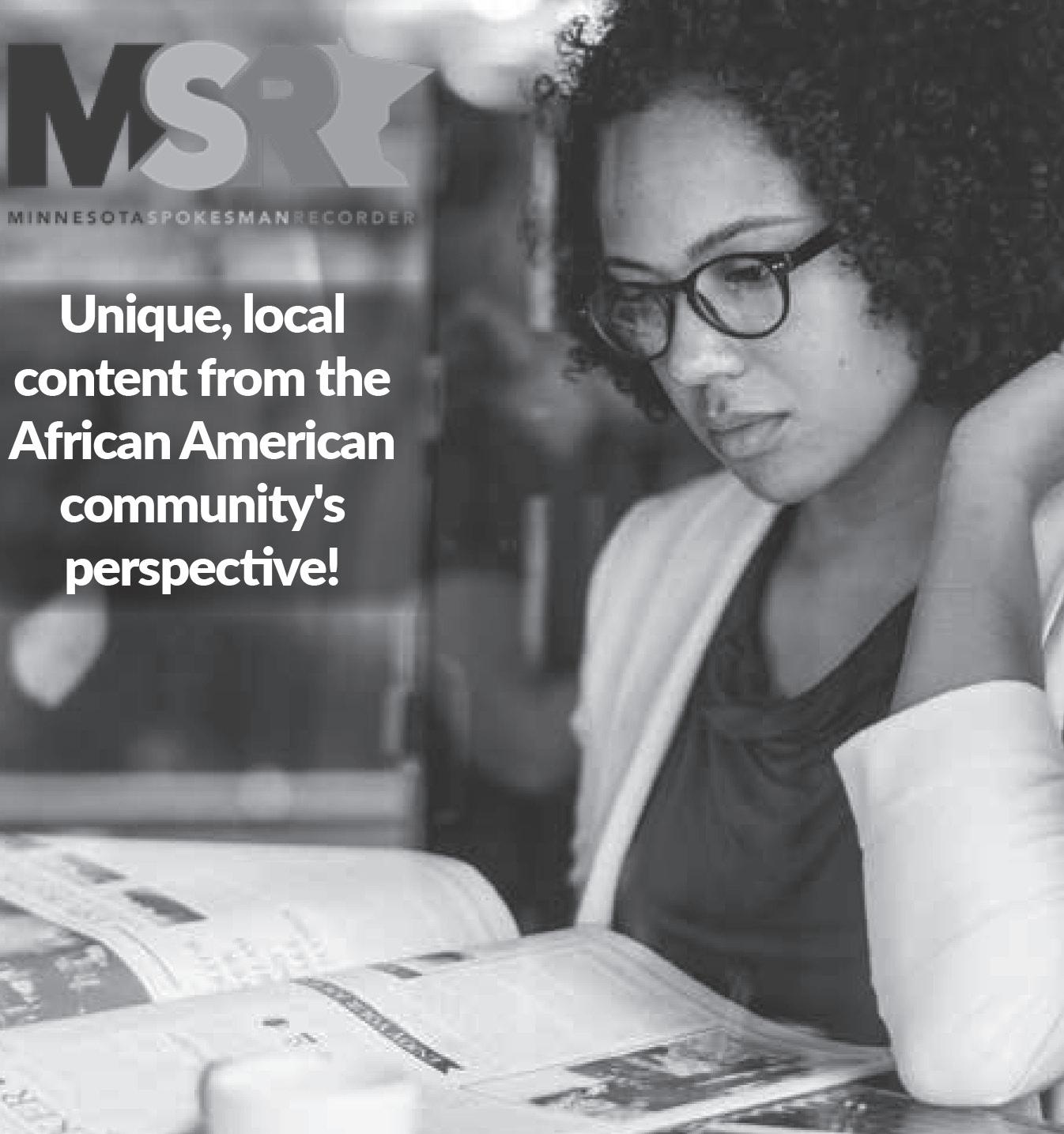

By Angel Akurienne Contributing Writer
Theatrical jazz received an expansive and celebratory exploration at Pillsbury House + Theatre’s first-ever Theatrical Jazz Conference on June 13-15 at the University of Minnesota.
Over the course of three days, artists and educators gathered from the academic and theatrical communities alike to examine the sankofa of the tradition across disciplines and celebrate the legacy of Laurie Carlos, Sékou Sundiata, Ntozake Shange, and many other revolutionary thought leaders.
Theatrical jazz is defined by Dr. Omi Osun Joni L. Jones, author of “Theatrical Jazz: Performance, Àṣẹ, and the Power of the Present Moment,” as “a way of making art and life. It has a spiritual base… What the work most often calls for is transformation. Many forms of theatrical jazz invite us to be open to that kind of transformation; for me, that’s spiritual.
It tends to be non-linear, allowing for the past, the present, and the “not here yet” to be accessed right here.” Dr. Jones delivered the conference’s culminating Blue Note Address.

The best of the field were featured through the weekend. The conference opened on Thursday evening with an open mic led by Sha Cage and E.G. Bailey. The three-day event provided an array of engagements and conversations from actors, movement artists, and directors, This included showcases from actors such as Antonio Duke, Sha Cage, Zell Miller III, Virginia Grise, Queen Drea, and Awotunde Judie Al-bilali; also workshops by Noelle + Leila Awadallah, Marvin K. White, Aimee Bryant, Sharon Bridgforth and Sonja Parks. Roundtables featuring directors such as CEO of Betty’s Daughter Arts Collective Ebony Noelle Golden, senior artistic producing director of Pillsbury House + Theatre Signe Harriday, and Founder of Rescripted.org Regina Victor, and Professor of Performance and Theater for Social Change at the University of Massachusetts Amherst Awotunde Judie Al-bilali.
Also featured were dramaturgs such as Professor at Department of Theatre Arts and Dance at the University of Minnesota Talvin Wilks, Queer Black Troublemaker and Black Feminist Love Evangelist Dr. Alexis Pauline Gumbs, Assist. Professor in the Department of Theater at the University of Massachusetts Amherst Pricilla Maria Page, and Chair of the Department of Dramatic Arts at the University of
Connecticut Megan Rivas. “Theater used to always only have this multiplicity and this composition and the music is always there,” Regina Victor stated during the director’s roundtable. “Theater was considered incomplete if you were just talking.”
Ebony Noelle Golden + Company performed “Quickening: Ceremonies from in the Name of the Mother Tree.”
Sage Ni’ja Whitson + Douglas Ewart + Marvin K. White + Talief Ticker + Tumelo Khupe performed “this here dust”closing out Friday.
The event closed on Saturday with a tribute to Laurie Carlos, a standard bearer and late performance artist, and a dance celebration followed.
Recordings of the directors and dramaturgs’ roundtable can be found on pillsburyhouseandtheatre.org.
Angel Akurienne welcomes reader comments at angelakurie@gmail.com.
“Music in the room is connected to blood, water, rhythm, breath, where does our mind go when we should be present, and how do we call ourselves back to ourselves,” proclaimed Ebony Noelle Golden when asked about how music informs the work. “What are you hearing and who are you trying to connect with across time and space? What frequency do you need to connect with them? This is the music.”







As the Minnesota Spokesman-Recorder approaches its 90th anniversary, you’re invited to commemorate this historic milestone by donating $90 to celebrate 90 years of continuous publication.
Your generous contribution will support our legacy of dedicated community empowerment through journalism and ensure our vital work continues into the future.
As a “$90-for-90” contributor (non-business), your name will be prominently displayed in our print and digital editions until the week of Aug. 10 — the date of our founding in 1934.
Please consider this unique opportunity to stand collectively with the MSR, honoring 90 years of tradition and community service. For inquiries or to join as a “$90-for-90” supporter, call 612-827-4021, visit our website, or email admin@spokesman-recorder.com.
Torrion Amie
Ray Seville Productions
Holly Andersen
Kimerlie Geraci
Jonathan Beck
David Fettig
Clara Boykin & Family
Tracy Wesley
Gretchen Bratvold
Amanda Brinkman
The O’Neill Family
Liam Cavin
Toweya Brown-Ochs
Deanna Callender
Your Name Here
Liam Cavin
Your Name Here
Janis Clay
Your Name Here
Edward Coblentz
Your Name Here
Michael Davis
Your Name Here
Victoria Davis
Michael Diehl
Your Name Here
April A. Estes
Your Name Here
George Ewing
Your Name Here
Elizabeth Fealey
Your Name Here
David Fettig
Your Name Here
Readus Fletcher
Your Name Here
Lee Friedman
Ella Gates-Mahmoud
Your Name Here
Kimerlie Geraci
Your Name Here
Leota Goodney
Your Name Here
Angelo Hughes
Your Name Here
Katie Izzo
Your Name Here
Your Name Here
Nina Johnson
Your Name Here
Clarence Jones
Your Name Here
Debra Jones
Your Name Here
Nathaniel Khaliq
Zena Kocher
Your Name Here
Lisa Lissimore
Your Name Here
Michele Livingston
Your Name Here
Harlan Luxenberg
Your Name Here
Melanie Manaen
Deborah Montgomery
Your Name Here
Debbie Morrison
Your Name Here
Marcia Murray
Your Name Here
The O’Neill Family
Your Name Here
Liz Oppenheimer & Jeanne Burns
Your Name Here
Ray Seville Productions
Your Name Here
Mary Quinn McCallum
Your Name Here
Amy Pfankuch
Your Name Here
Patty Ploetz
Mark Ritchie
Your Name Here
Your Name Here
Lyn Rabinovitch & John Saxhaug
Your Name Here
Augustus Ritemon
Your Name Here
Carolyn Roberson
St. Paul Saints
Your Name Here
Elizabeth Schutz
Your Name Here
Floyd Smaller
Your Name Here
Timothy Sullivan
Your Name Here
Heidi Swank
Dotty Timmons
Your Name Here
Bill Wells
Your Name Here
Tracy Wesley
Your Name Here
Jeffery Young
Your Name Here
Your Name Here
Your Name Here
Your Name Here
Your Name Here
Your Name Here
Your Name Here
Your Name Here
Your Name Here
Your Name Here
Your Name Here
Your Name Here
Your Name Here
Your Name Here
Your Name Here
Your Name Here
Your Name Here
Your Name Here
Your Name Here
Your Name Here
Your Name Here
Your Name Here
Your Name Here
Your Name Here
Your Name Here
Your Name Here
Your Name Here
Your Name Here
Your Name Here
Your Name Here
Your Name Here
Your Name Here
Your Name Here
Your Name Here
Your Name Here
Your Name Here
Your Name Here
Your Name Here
Your Name Here
Your Name Here
Your Name Here
Your Name Here
Your Name Here
Your Name Here
Your Name Here
Your Name Here
Your Name Here
Your Name Here
Your Name Here
Your Name Here
Your Name Here
Your Name Here
Your Name Here
Your Name Here
Your Name Here
Your Name Here
Your Name Here
Your Name Here
Your Name Here
Your Name Here
Your Name Here
Your Name Here
Your Name Here
Your Name Here
Your Name Here
Your Name Here
Your Name Here
Your Name Here
Your Name Here
Your Name Here
Your Name Here
Your Name Here
Your Name Here
Your Name Here
Your Name Here
Your Name Here
Your Name Here
Your Name Here
Your Name Here
Your Name Here
Your Name Here
Your Name Here
Your Name Here
Your Name Here
Your Name Here
Your Name Here
Your Name Here
Your Name Here
Your Name Here
Your Name Here
Your Name Here
Your Name Here
Your Name Here
Your Name Here
Your Name Here
Your Name Here
Your Name Here
Your Name Here
Your Name Here
Your Name Here

By Aziah Siid
For decades, school choice— the education strategy of using taxpayer money to pay private-school tuition for kids attending failing K-12 public schools—has been a political football for politicians, a boutique issue for billionaire activists, and an enticing option for struggling Black parents, who simply want their children to have a shot at a better life.
The issue, however, has been a nightmare for administrators at cash-strapped, most
ly urban public schools. They see money that could help fix crumbling buildings or pay for more teachers siphoned off to mostly-white, private prep schools and academies that don’t really need it.
Now, school choice has become a signature issue for Shawn Carter, the hip-hop mogul and philanthropist better known as superstar rapper Jay-Z. He’s thrown his A-list status, and considerable fortune, towards helping students from struggling households leave public schools for private ones—for good.
“It’s an immediate need,” Diane Perez, CEO of Carter’s Roc Nation entertainment corporation, told USA Today last week. And earlier this month, Carter’s Roc Nation Entertainment company announced a campaign to help Philadelphia to secure about $300 million in scholarships so kids from low-income households can choose from the city’s array of private schools.
The two-week campaign
to raise the money comes in support of legislation aimed to increase education opportunities for underprivileged youth attending the state’s lowestperforming public schools. Roc Nation backs the Senate Bill 757 as public schools continue to shutter schools and lack of free summer programming keeps students away.
Jay-Z is just the latest billionaire who, despite having little or no experience in public education policy, believes public-school reform involves private-school vouchers.
Public schools need what’s going to private schools
Senate Bill 757 would create a program called Pennsylvania Award for Student Success (PASS) Program, which would offer varying amounts of private-school scholarships. It would include roughly $2,500 for half-day kindergarten students, $5,000 for K-8 grades, $10,000 for 9-12 grades, and $15,000 for students with special needs.
Jay-Z’s representatives argue that their sole mission is to support families and students by giving them a chance to opt out of a dysfunctional public

By Marshall H. Tanick
That Republican Florida Congress Member Byron Donalds is not a lawyer is neither a personal or professional deficiency. But with no legal training, he ought not propound on legal topics displaying his profound misunderstanding, as he did other day by calling for the Supreme Court to “step in’’ and undo former President Trump’s 34 felony convictions in the ”hush money” case in New York City.
The High Court has no jurisdiction over the matter, and even if it did, the ex-president has not appealed it there, making the imploration by Rep.
Donalds a non-starter.
The congress member might deserve some slack because he has no legal training. But with that kind of observation, he couldn’t even pass a law school admissions test.
Rep. Donalds is not much of a sociologist, either. His nostalgic praise for the Jim Crow era because it was beneficial for Black people like him and their families did not go over too well, except with white supremacists.
But, to his credit, he did not go as far as his fellow Florida Republican Gov. Ron DeSantis in extolling the state’s new education curriculum that Black people derived some “personal
benefit” from enslavement.
Nonetheless, Rep. Donalds remains on the ex-president’s short list for vice president. But that’s problematic too, because the Constitution bars candidates for president and vice president on the same ticket from residing in the same state.
So, unless he moves or the ex-president packs his boxes of national security secrets and departs from the state, they can’t run together; it’s right there in the 12th Amendment if he bothers to read it.
school system that can’t meet their needs.
“The decision to back a bill aimed at enrolling more lowincome and minority students into private schools left many uneasy with the decision,” according to a statement Roc Nation sent to the website AFROTECH. “Parents are simply at the mercy of the system, where their kids’ academic futures are predetermined based on economic status and the location of their homes. The reality is the current system is fundamentally flawed and failing our youth.”
But education experts say that shifting money from public schools to wealthy private ones effectively privatizes education at taxpayer expense. And it does nothing for public schools that desperately need more help.
“The issue with the PASS program, and even Roc Nation’s decision to support it, is older than this moment,” says Fedrick Ingram, secretary-treasurer of the American Federation of Teachers. “The effort to privatize schools via voucher programs or ‘school choice’ is decades long but always ends up at the same place: defunding public schools, the schools that 90% of children attend.”
Left unchecked, Ingram and others argue, voucher programs have the potential to drain state education budgets and force the closing of even more public schools. “Instead of draining public schools of vital funding, let’s listen to teachers, students, and their families about what public schools are doing well and where there is room for improvement,” Ingram says.
Camika Royal, author and professor, says it’s understandable for parents to want better for their kids. But giving millions in public funds to private schools won’t improve public schools.
“What happens a lot of times is people have had bad expe-
I’ll choose the ethical candidate every time
By Mark Cuban
Biden’s debate performance was awful. But so was Trump’s. Biden was feeble. Trump couldn’t directly answer a single question and lied with every response. The question is what features voters believe make a better POTUS: feeble, capable and ethical vs. vigorous, unethical and incapable of telling the truth.
I’ll vote ethical every time.
The reality is Biden wasn’t capable of debating someone who only lies. He doesn’t have the energy or ability to shout him down, hold him accountable, and laugh at Trump’s responses. Biden could have held his own against a candidate that actually can discuss policy. But that wasn’t the challenge [at the debate], and Biden wasn’t prepared or capable of dealing with Trump and his style.
That aside, there is no way you could listen to Trump at the debate and come away feeling confident that he has the ability to go deeper than his practiced soundbites.
He repeated himself often and never directly answered the moderator’s questions. There was nothing that would give anyone confidence he
riences with public schools,” she says. “People see public schooling as something that is inherently bad, and I don’t think it has to be inherently bad. But taking $300 million from it certainly won’t make it any better.”
The rich aren’t education experts
Jay-Z is just the latest billionaire who, despite having little or no experience in public education policy, believes public-school reform involves private-school vouchers.
could hold his own in any complicated situation. Or that he could intellectually go toe to toe with any world leader or adversary.
In fact, his nonanswers about J6 and election acceptance should scare every American about his interest in upholding his oath to the Con-
The question is what features voters believe make a better POTUS: feeble, capable and ethical vs. vigorous, unethical and incapable of telling the truth.
stitution. That doesn’t make Biden’s performance any less awful, but he answered the questions he was asked, even if the presentation was underwhelming.
And we have the last threeplus years of his being POTUS without his getting laughed at or smirked at, no tell-alls or leaks discussing his incompe-
tence. No former advisors or cabinet members saying they won’t vote for him.
That gives me confidence that in the normal duties of the presidency he can hold his own and do the job. Unfortunately, this election is not about policies. It’s about soundbites, social media, and who delivers them better, and the algorithms that deliver them to voters. Trump is far better than Biden at soundbites and marketing.
That’s reality. For that reason, I’m also open to the discussion to replace Biden and/ or Harris. It’s not like Trump’s approval ratings are high. They aren’t. It could be an open door to find someone that immediately outperforms Trump.
Beyond the loyalty of Biden ’s hardcore 3% or so, I think a large number of people who currently support him would walk away to a better alternative. But if that doesn’t happen, I’m still voting for Biden, the ethical candidate who unquestionably stands by his oath and puts country over self-interest.
Mark Cuban is a businessman, film producer, investor, and television personality. This commentary was shared via X (formerly known as Twitter).
submissions@spokesman-recorder.com

submissions@spokesman-recorder.com
submissions@spokesman-recorder.com.
“There’s a lot of need in the school district of Philadelphia primarily because its buildings are old, so there’s infrastructure issues,” Royal says. “I would love to have brother Shawn Carter donate his efforts and drum up support around that.”
This commentary is republished with permission from Word in Black.
“The people behind this push, people like (former Education Secretary) Betsy DeVos and (Wall Street financier) Jeff Yass, are billionaire Trump acolytes with no expertise in education or teaching,” Ingram tells Word In Black. “Taking control of education out of the hands of the many and into the hands of the few is exactly what extremists are aiming for.” Royal says if Jay Z really wanted to improve education for poor children he could follow the example of Jalen Hurts. The superstar NFL quarterback who plays for the Philadelphia Eagles recently donated $300,000 to put air conditioning in the city’s schools.

Affordable advertising packages are available for small to medium-sized businesses, corporations and non-profit organizations in print & online.
will be able to help you. Contact our office at 612-827-4021 or email at: ads@spokesman-recorder.com
By Abdi Mohamed
Associate Editor
“Reasons for Moving” at the Southern Theater showcased an interdisciplinary performance that captured the story of three individuals whose immigrant backgrounds varied as first, second and third generations, but whose struggles for belonging threaded their tales together.
The production starred Kalala Kiwanuka-Woernle, whose mother left Uganda for the UK and later came to the U.S. on a student visa; Mai Moua Thao, born in a refugee camp in Thailand; and Skye Reddy, whose family lost their ancestral homelands in the colonial partition of South Asia. The performance’s title comes from a line in the poem “Keeping Things Whole,” by Mark Strand. Each performer took to the stage carrying the weight of their family’s journeys and experiences. Through a mix of choreographed dancing, prose, beautifully laid out projections, and stand-up comedy, the show enveloped audiences in the stories of the performers that spanned generations and
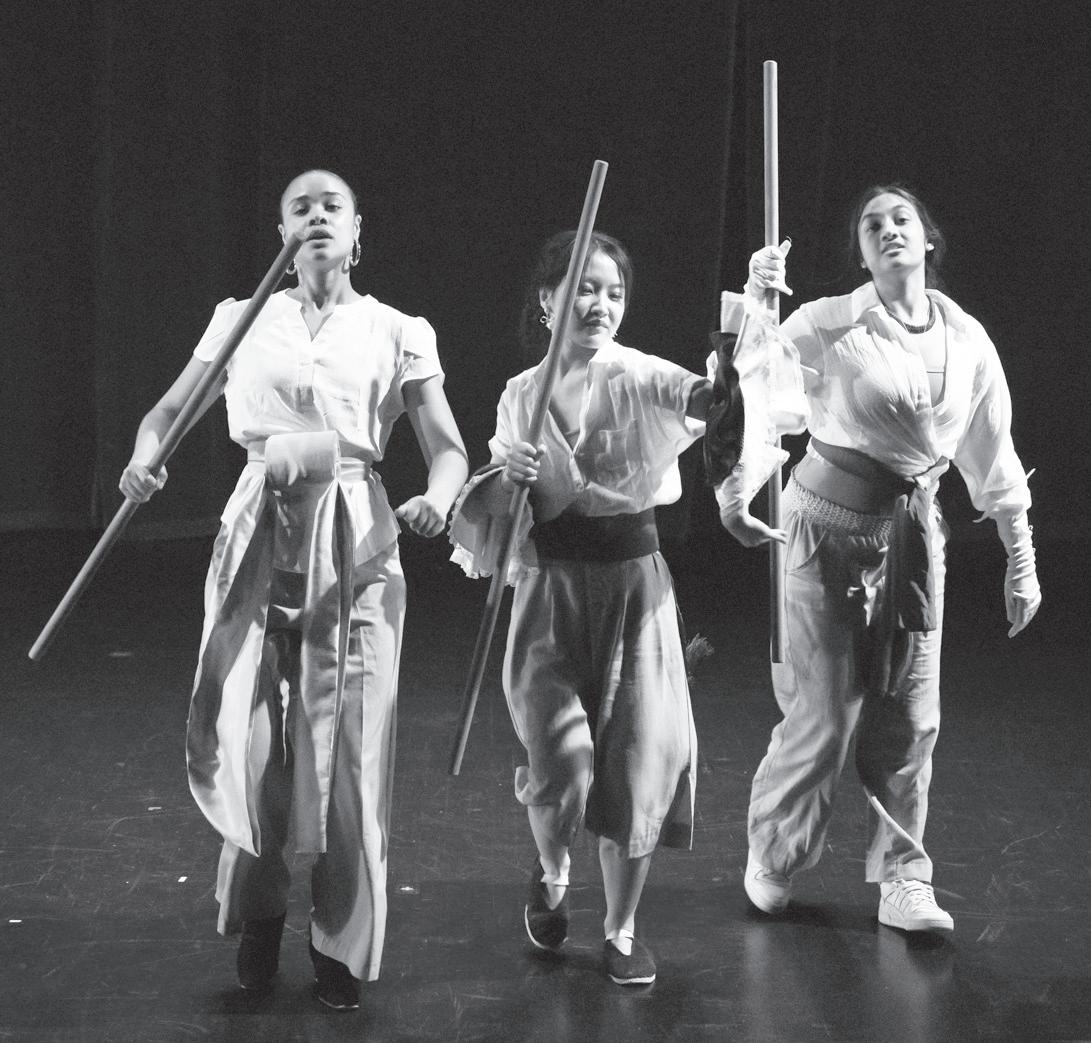
“Reasons
with their most vulnerable secrets. The stories of their family’s or personal immigrant experiences weighed heavily in the air as they transmuted their stories to the stage.
Director Cláudia Tatinge Nascimento explained that the production is not a documentary performance, but rather served as a mix of fact and fiction. “It highlights how transgenerational memory is transmitted: Our imagination fills the gaps in the stories told by our elders,” she said. Nascimento also serves as the chair of theater and dance at Macalester College in Saint Paul, where she first worked with the performers as students.
structure.” She added, “‘Reasons for Moving’ challenges the idea that the immigrant experience is monolithic.’”
The stories of their family’s or personal immigrant experiences weighed heavily in the air as they transmuted their stories to the stage.
childhood memories in Thailand to speak on the difficult challenges she’s endured in this country. Her tale helped capture a piece of the larger Hmong American experience that is often left out of mainstream discourse. “The Hmong community is a stateless nation. Displacement and migration have always been a part of the people’s history. They are actually connected by history of moving away and moving forward,” she stated.
experiences of first, second and third-generation immigrants. Courtesy of
rooted itself in an unapologetic sense of honesty. The show began with ethereal performances by the cast, whose coordinated movements and flowing style, complimented by the mixed media projections on stage, captured the audience’s imagination. Prior to the beginning of the show the audience was advised to sit as close and central
Cláudia Tatinge Nascimento
to the stage as possible to better their viewing experience.
The production’s sense of intimacy through this proximity to the stage, matched with the personal storytelling of the performers, made the experience of the production feel as though it was something to cherish, similar to a good friend divulging personal information and trusting you
College itself may not be the ‘great equalizer’ Luck and hiring practices also play
By Jessi Streib
College helps, but widespread employment practices that keep salary information hidden seemed to play a larger role for the students I interviewed. Prospective employers in that job market frequently hide key information, such as salary range and a detailed job description, that would help graduating students decide what jobs to apply for. The information is often not provided until a job offer is made.
In addition, employers regularly offer graduating students different amounts to do similar jobs, so it’s hard for the soon-to-be grads to develop a general idea about what they should be paid for the type of work they want to do.
Salary information found on websites such as Glassdoor is often unreliable.
Because of this, graduating students whose parents have different levels of education— one facet of socioeconomic status—must guess where to apply to get ahead. That makes luck the “great equalizer” for people with bachelor’s degrees.
In addition to hiding salary information, hiring agents tend to obscure the criteria they use to evaluate prospective employees. For example, they might announce that they are looking for applicants with strong communication or teamwork skills, but they don’t describe what meets those criteria.
Good communications could mean the ability to be concise or to be thorough and a bit wordy.
On top of this, different hiring agents may use contradictory criteria. I’ve found that some prefer students who answer quickly and decisively, while


others want those who take time before responding.
At the same time, employers—those who hire students such as the business majors I interviewed—tend to use neutral criteria that students from all class backgrounds can meet. They often don’t require a high GPA and ignore students’ status symbols, such as familiarity with expensive activities such as golf, skiing and international travel.
Reddy echoed this point, stating that “coming from cultures that traditionally do not have a strong written tradition, the stories of previous generations have died with them.
“Reasons for Moving” has given me an avenue to ask questions about my family’s origins that I didn’t even think to ask until we began creating.”
Kiwanuka-Woernle found that the production “grounds the personal to the universal in an interdisciplinary performative
families, who are more likely to know how to negotiate, lose their advantage. This, in turn, leads to less disparity in income for new hires.
Students from more privileged backgrounds tend to have more family members and friends who can help them find jobs. But when pay is hidden, the people in students’ networks often lack needed information and so are just as likely to lead students into low-paying positions as highpaying ones, according to my research.
In the show, Kiwanuka-Woernle embodied her mother as a character on stage, taking the audience through the process she had to overcome as a student in the United States looking for stability and the peace of mind to call this new place home. With an impressive range of performances, Kiwanuka-Woernle showcased both her pride and insecurities on stage as she planted her stake in the ground, mapping her own identity and speaking boldly with assurance.
Thao’s performance was gripping as she pulled from
Audiences who attend this production are set for an engaging show that also holds a surprise element of audience participation. Be sure to come bearing questions in mind, but also be prepared to leave posing questions to yourself about your own journey to where you now call home.
“Reasons for Moving” continues to play at the Southern Theater until June 30. Tickets can be purchased at https://southerntheater.org/shows/reasonsfor-moving
Abdi Mohamed welcomes reader comments at amohamed@ spokesman-recorder.com.

Students from more privileged backgrounds tend to have more family members and friends who can help
Generally, students who are more advantaged are more likely to turn to their family, friends, or the career center to get advice on job-search issues such as resumes and interviews. When information about the hiring processes is hidden, the advice students receive is rarely useful.
them find jobs.
They also tend to refuse to negotiate with new college graduates over pay. Students from middle- and upper-class

Instead, their friends and family tell students to prepare for questions that are never asked and advise them to answer questions in ways that particular hiring agents might penalize. For example, one student I spoke with was advised to keep his answers short; the interviewer later told him he didn’t get the job because his answers weren’t expansive enough.




Students at public universities who are not business majors may encounter different processes, but my findings are likely to extend to many other students at non-elite universities as well. For a large swath of college graduates, whether they happen to apply for a job that pays well boils down to luck. For that reason, luck—in addition to a degree—likely acts as the great equalizer.
Jessi Streib is an associate professor of sociology at Duke University. This article is republished from The Conversation under a Creative Commons license.
From Ads Department/MN Spokesman-Recorder
PHONE: 612-827-4021
FOR BILLING INQUIRIES & TEARSHEETS
Estate of AUDREY LA JUNE STORM, DECEDENT.
Please contact Accounting Dept @ BILLING@SPOKESMAN-RECORDER.COM
From Ads Department/MN Spokesman-Recorder
PHONE: 612-827-4021 FOR BILLING INQUIRIES & TEARSHEETS
PLEASE CONTACT ACCOUNTING DEPT @ BILLING@SPOKES -
BY AN AGREEMENT IN WRITING, OR ( `ii) FOR RETAINING COUNSEL TO CARRY ON OR TO CONTEST THIS PROCEEDING: (2) NEITHER PARTY MAY HARASS THE OTHER PARTY; AND (3) ALL CURRENTLY AVAILABLE INSURANCE COVERAGE MUST BE MAINTAINED AND CONTINUED WITHOUT CHANGE IN COVERAGE OR BENEFICIARY DESIGNATION.
IF YOU VIOLATE ANY OF THESE PROVISIONS, YOU WILL BE SUBJECT TO SANCTIONS BY THE COURT.
Respectfully Submitted,
2024
Minnesota Spokesman-Recorder July 4, 11, 18, 2024
STATE OF MINNESOTA SECOND JUDICIAL COUNTY OF RAMSEY DISTRICT COURT FAMILY COURT DIVISION
In the Matter of the Welfare of the Child of: Group ID: 0375633
Maria Belen Philipp, Parent/Petitioner and Petition Number: 62-JV-24-482
William M. Spann Jr. Parent/Respondent SUMMONS AND NOTICE
NOTICE TO: William M. Spann Jr., legal custodian or parent of the child/ren. ATTENTION
1. A Termination of Parental Rights Petition has been filed in the Office of the Clerk of Juvenile and Family Justice Center, 25 West Seventh Street, Saint Paul, Minnesota, alleging among other things that the parental rights of the above-named parent(s) or legal custodian(s) to the child(ren) named in the petition, should be terminated upon grounds as stated in the petition filed in the Office of the Clerk of the Juvenile and Family Justice Center, 25 West Seventh Street, Saint Paul, Minnesota, and asking for an order of this Court terminating such parental rights.
2. THEREFORE, notice is hereby given that the matter of said petition requesting to terminate your parental rights will be called for hearing before the Juvenile and Family Justice Center, 25 West Seventh Street, Saint Paul, Minnesota, on August 07, 2024 at 3:30 PM or as soon after as the Matter can be heard.
3. YOU ARE THEREFORE ORDERED, to appear before said Court at said time and date.
4. You have a right to be represented by counsel.
5. If you fail to appear at the hearing the Court may still conduct the hearing and grant appropriate relief, including terminating your parental right to the child(ren) named in the petition.
WITNESS, the Honorable Leonardo Castro Chief Judge, Second Judicial District Donald W. Harper, Juvenile and Family Court Administrator Minnesota Spokesman-Recorder June 20, 27, July 4, 2024
Continued from page 10
him,” added Lawrence’s father Carlton. Hill and Sapp were named Sunday to the 12-man USA Paralympic Team. “I feel good to head to Paris…and bring home some gold,” Hill told us after the team announcement. Both Black swimmers are appearing in their second Paralympic Games. “Lawrence is like a younger brother that I never had,” said Hill. “The dude got a lot of spirit, and as long as we can channel that into swimming…keep your eyes on him and keep your eyes on me.” Added Sapp, “I have been working so hard to get to my second Paralympic Games. I look forward to the race and be up on the podium in Paris.”
“I’m happy for him, and I am happy for Jamal,” said Carlton
Sapp. “I’m hoping that this inspires others, especially others in our community to come out to the Games.”
“He is looking forward to getting a podium finish this time,” added Dee Sapp of their son Lawrence.
She too pointed out how important it is that both Black swimmers made the USA team.
“It’s extra special because representation does matter,” she said. “A lot of people don’t get to see Black athletes succeed at this level, so it’s very important and exciting.”
Being a USA team member “representing not only myself and the Black community, but for the country when I get up on that block,” said Hill. “There’s no longer Jamal Hill. There’s only Team USA.”
Charles Hallman welcomes reader comments at challman@ spokesman-recorder.com.
TO ALL INTERESTED PERSONS AND CREDITORS:
SUMMONS PREPAID FLAT RATE: $110 X 3 WEEK RUN TOTAL: $320
Notice is hereby given that an application for informal appointment of personal representative has been filed with the Registrar. No will has been presented for probate. The application has been granted.
Notice is also given that the Registrar has informally appointed Pamela Resch, whose address is 413 John Street, Edina, MN 55343, as personal representative of the Estate of the Decedent. Any heir, devisee or other interested person may be entitled to appointment as personal representative or may object to the appointment of the personal representative. Unless objections are filed with the Court (pursuant to Minnesota Statutes section 524.3B607) and the Court otherwise orders, the personal representative hasfull power to administer the Estate including, after 28 days from the date of issuance of letters, the power to sell, encumber, lease or distribute real estate.
Please proof, respond with email confirmation to ads@spokesman-recorder.com
The MSR handles billing digitally. This means you will get e-tears and e-mailed invoices unless you specifically request a hard copy.
Any objections to the appointment of the personal representative must be filed with this Court and will be heard by the Court after filing of an appropriate petition and proper notice of hearing.
Notice is also given that (subject to Minnesota Statutessection 524.3B801) all creditors having claims against the Estate are required to present the claims to the personal representative or to the Court Administrator within four months after the date of this Notice or said claims will be barred.
Dated: June 21, 2024
Attorney for Personal Representative
Bradley R. Janzen
Bradley R. Janzen, P.A.
574 Prairie Center Dr. Suite 135 – 262 Eden Prairie, MN 55344
Attorney License No: 0049712
Telephone: 612 – 817 – 2481 Email: mnlawyer@gmail.com
From Ads Department/MN Spokesman-Recorder
Sara Gonsalves District Court Administrator
Minnesota Spokesman-Recorder July 4, 11, 2024
State of Minnesota
PHONE: 612-827-4021 FOR BILLING INQUIRIES & TEARSHEETS
Certificate of Assumed Name Minnesota Statutes Chapter 333
PLEASE CONTACT ACCOUNTING DEPT BILLING@SPOKESMAN-RECORDER.COM
ASSUMED NAME: Third Eye Collaborative
PRINCIPAL PLACE OF BUSINESS: 308 PRINCE ST APT 611 SAINT PAUL MN 55101 USA
SUMMONS PREPAID FLAT RATE: $110 X 3 WEEK RUN TOTAL: $320
NAMEHOLDER: The M2Foundation 308 PRINCE
By typing my name, I, the undersigned, certify

Please Note: New email address for all future ads is ads@spokesman-recorder.com
I am
as the person whose signature is
or as agent of the person(s) whose signature would be required who has authorized me to sign this document on his/her behalf, or in both capacities. I further certify that I have completed all required fields, and that the information in this document is true and correct and in compliance with the applicable chapter of Minnesota Statutes. I understand that by signing this document I am subject to the penalties
The MSR handles billing digitally. This means you will get e-tears and e-mailed invoices unless you specifically request a hard copy.
SIGNED
EMAIL FOR OFFICIAL NOTICES: gmartin@trautlaw.com Minnesota Spokesman-Recorder
Continued from page 10
kids holding up signs, [that] makes me really happy.”
Making the USA team “would be satisfying a desire that I’ve had since I was a little boy,” added Young.
Wittenberg, the oldest of the three black gymnasts at age 29, admitted, “I grew up obviously not having many Black athletes to look up to in gymnastics … I want to be that person that shows that all the hard work pays off and I can motivate them.”
Richard finished first among the participants and made the seven-man USA Gymnastics Team, and Young was named one of two alternates.
Former Florida gymnast
Trinity Thomas, one of the most successful NCAA gymnasts in history, did not qualify to compete in last week’s
trials, but took part in signing autographs and posed for pictures with fans.
“It’s a blessing to be an inspiration to so many young women and men too,” Thomas told the MSR. “I like doing the photos and the autographs.”
Behind the scenes, Rachel Duke was one of the most visible Black officials for USA Gymnastics—she is the communications coordinator. “I would say half of my job is many relations working with you guys, getting what you need and all that stuff. Then the other half is editorial like writing press releases, figuring out the editorial calendar,” she explained.
Duke was a USA Gymnastics summer intern before being hired full time in February 2023.
Charles Hallman welcomes reader comments at challman@ spokesman-recorder.com.
From Ads Department/MN Spokesman-Recorder PHONE: 612-827-4021 FOR BILLING INQUIRIES & TEARSHEETS PLEASE CONTACT ACCOUNTING DEPT

ASSUMED NAME FLAT RATE $215.00 2 WEEK RUN
Please proof, respond with email confirmation to display@spokesman-recorder.com
Continued from page 10
He led them to four consecutive conference championships (1990-93) and two state tournament appearances (1991 and 1997).
In 1991 Don “Tex” Phillips, Wayne Charles, and Steve McArthur led the Teddies to a Class AA runner-up finish. Six years later the 1997 team—with Donnie Groce, Stacey Barrett, Antonio Fondren, Romero Nelson, Arione Farrar, and Joe Mitchell—made a surprising run in the state tournament, placing third in Class AAA. Hentges retired after the 1998 season.
I didn’t know at the time during that Twin City game that both Hentges and Prohofsky would have such a positive influence on this
young sportswriter. When I started covering Roosevelt’s girls, I had never had a personal interaction with Hentges. Then, while at the 1989 girls state tournament, Carpenter approached me. “My coach wants to meet you,” the junior forward said. Upon introducing ourselves, he thanked me for the coverage.
Prohofsky waved me in after my identity as a sportswriter was confirmed, but interestingly enough, I had only interacted with him once before.
That Twin City game is a memory etched in my mind forever. Not only was it a great game, but I was in the presence of two of the best to ever coach it.
Dr. Mitchell Palmer McDonald welcomes reader comments at mcdeezy05@gmail.com.
Minneapolis last week was the final stop on the journey to the 2024 Paris Olympic Games. Downtown Minneapolis was renamed 2024 Gymnastics City USA as the USA Olympic gymnastics trials and other related events took place. Just a few miles away at the University of Minnesota, the 2024 U.S. Paralympic Team Trials for swimming was held at the Jean K. Freeman Aquatic Center. The MSR covered both Olympic-related events for the first time.
By Charles Hallman Sports Columnist
aralympics is a series of domestic and international contests for athletes with disabilities that usually is held the same year as the Summer and Winter Olympics and at the same site.
This year it’s in Paris in August.
Jamal Hill was among notable Paralympic legends and one of hundreds of swimmers who competed for spots on the 2024 USA Paralympic Team. He and Lawrence Sapp were the only Black swimmers we found during last week’s threeday event on the Minnesota campus. Both also were victorious in their respective events.
Now 29, Hill is considered among the world’s best Paralympic athletes, but for many years as he grew up he wondered if he would be able to swim competitively due to a condition he contracted at age 10. He was diagnosed with Charcot-Marie-Tooth (CMT),
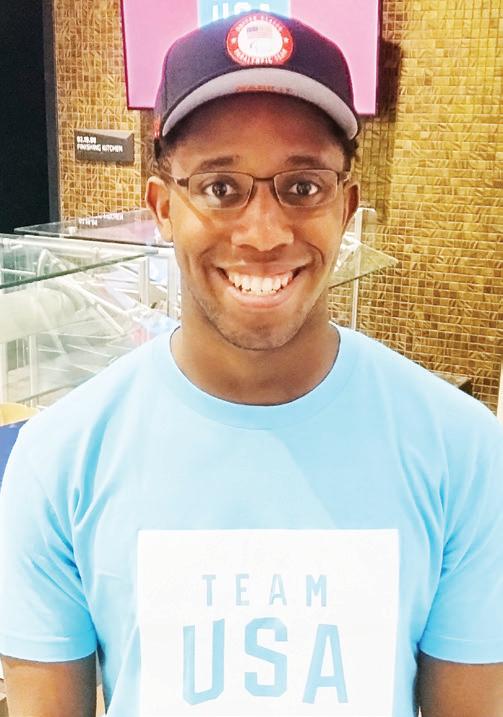
a hereditary neurological condition. As a result, he kept his condition a secret from almost everyone. It wasn’t until he became an adult that he finally learned it was called CMT. As an infant, Hill’s mother wanted her son to learn to swim to avoid the age-old axiom that Black people are scared of the water. She enrolled him in a YMCA swimming class, where Jamal first developed his love of swimming.
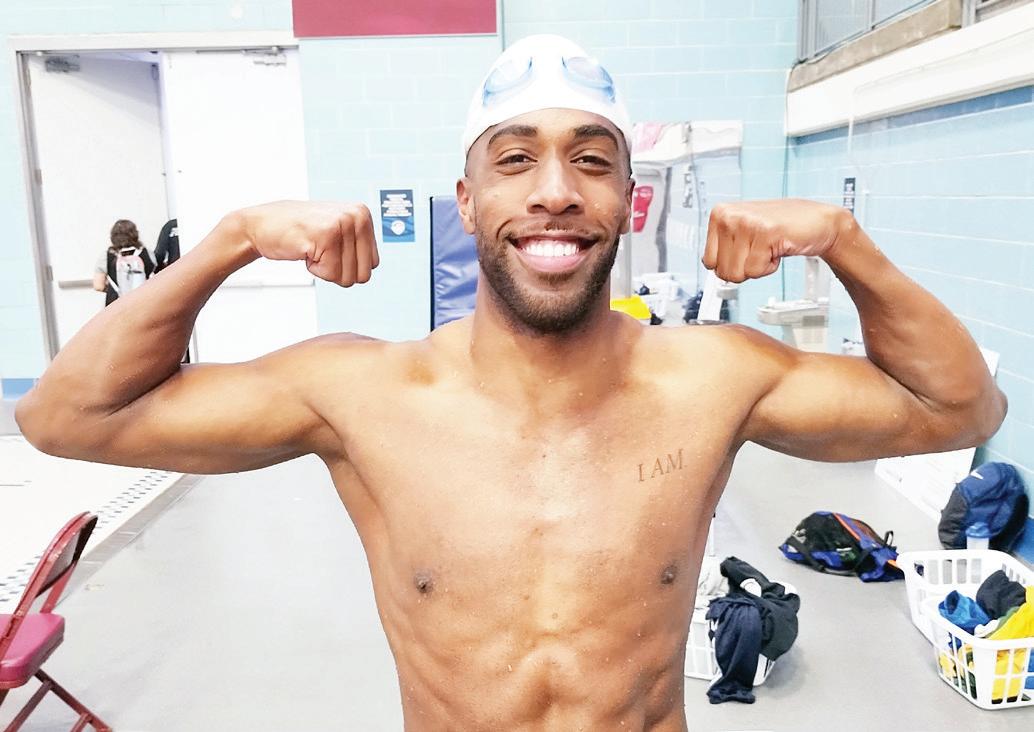

oth Gopher basketball teams are in the midst of their respective summer workouts, which began in June.
The Minnesota men added six seniors to the 2024-25 season roster along with two returning starters (Dawson Garcia and Mike Mitchell) to a squad that was last season’s Big Ten best in terms of win improvement (19-15 overall) in 2023-24.
The Gopher women finished as 2024 WNIT runnersup and finished 20-16 overall in Dawn Plitzuweit’s first season as head coach. Minnesota returns four starters, including
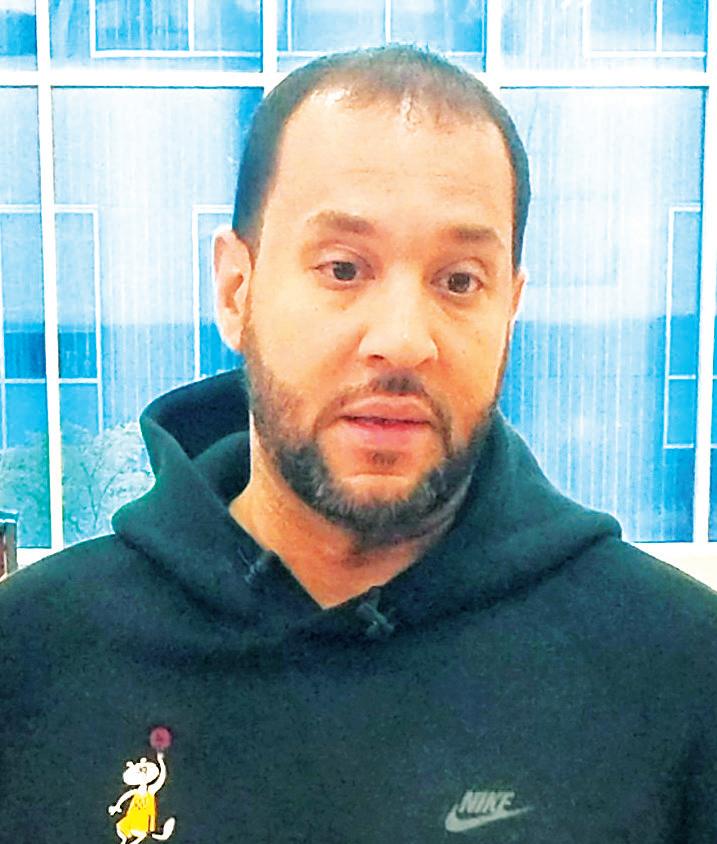
junior Amaya Battle, who last week was one of three players named 2023-24 Big 10 Distinguished Scholar Award recipients.
“She has the potential to be an elite guard, but an elite leader, too,” Coach P said of Battle. She told the MSR that the 5’11” guard from Hopkins “is someone who wants that but doesn’t really know what that all encompasses yet and asks a lot of very good questions.
“I think she can be one of the best, not only in our conference, but nationally,”

“My mom never learned how to swim. So, when I was a baby…ultimately swimming became my first love from there.” Hill began swimming competitively as early as elementary school, he recalled, and kept swimming all through high school and three years of college before he quit to train for the Olympics. He also learned from his current coach Wilma Wong that he could effectively compete even with his disability, and he didn’t have to keep it a secret.
“I’m definitely at the top,” said a very confident Hill, who became only the second Black American to win a Paralympic medal. “My first Paralympic Games and I won a bronze medal in the men’s 50-meter freestyle (in Tokyo in 2020),” he pointed out.
“I
Because of CMT, his ability to walk, let alone swim, could come to an end. Hill said he doesn’t take anything for granted, especially competing.
“Lawrence started swimming when he was four years old,” explained Dee Sapp, Lawrence’s mother. “We got him into swimming because he was non-verbal—he has autism and an intellectual disability. Learning to swim for him was a life skill.”
“It’s been a long journey for
predicts the head coach.
Head Coach Ben Johnson, now in his fourth season, told us before a recent summer practice, “It is just about building, staying healthy, and continuing to do what we do and not get sidetracked.” The Minneapolis native added, “You want to have a locker room full of guys that expect to win.”
Once again, Johnson must “rebuild” his roster due to transfers. Nonetheless, he reaffirmed, “We’re on the right trajectory.”
He also pointed out that along with the returning players, the nine newcomers “understand what goes into winning. I like the fact that they all have pretty good feel, pretty good IQ.”
Now in her second season in Minnesota, with most of her players back from a year ago, “I think our returning players just have more understanding, more confidence for more skills,” noted Plitzuweit. “I think the new players have brought us some size, athleticism, speed. They’ve added some different pieces.”
The newcomers include sophomore transfer Taylor Woodson from Michigan—the Minnetonka native is one of three new Blacks on the squad.
“We can get through the drills a little quicker and not have to explain our drills anymore,” added Assistant Coach Aaron Horn. He and fellow assistant Ariel Braker rejoined
By Charles Hallman Sports Columnist
here were six Black female gymnasts expected to compete for a spot on the USA Paris Olympics gymnastics team last week in Minneapolis: Simone Biles, Simone Rose, Zoey Molomo, Shilese Jones, Skye Blakely and Jordan Chiles. Both Blakely and Jones got injured and weren’t able to continue.
Biles and Chiles were named Sunday to the USA team.
“I think representation is incredibly important to have Black and brown [gymnasts] on both the men’s and women’s side to showcase their talents at the highest level,” said Jessica Poole of St. Paul. She and her best friend were among the well over 50,000 who attended the four-day event that began last Thursday and concluded Sunday night.
“I think that’s something that we should celebrate and talk about a whole lot more than we do,” Poole continued.
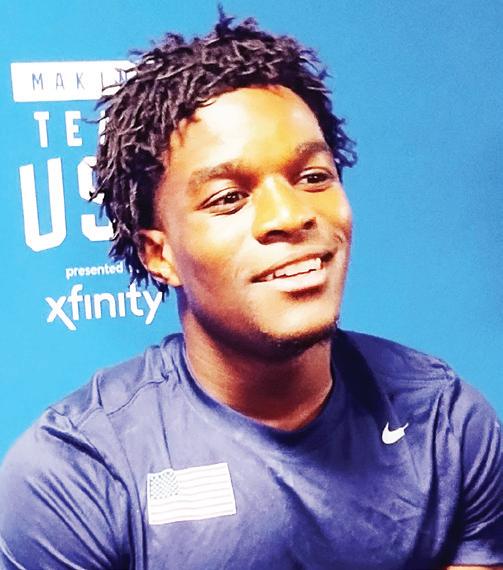
“It’s wonderful to see how our Black and Brown athletes have expanded sports. We are no longer just basketball, softball, baseball players. We have Black and brown athletes in lacrosse, swimming, and Black and brown gymnasts.”
It was our first-ever opportunity to see Biles perform in person. She definitely is a superstar gymnast who regularly drew extended loud cheers from the crowd whenever her turn came up, like she was playing for the Minnesota Lynx.
There were three Black male gymnasts at last week’s trials:

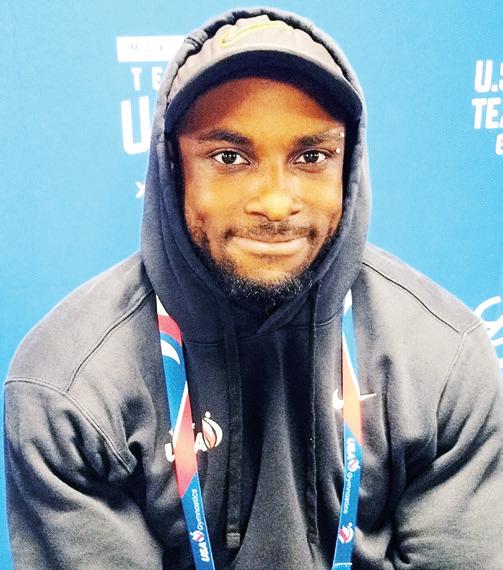
Coach P last season after being together with her in West Virginia.
“I like the new kids that we brought in as well,” said Braker. Plitzuwitz told the MSR that Horn and Braker’s presence on the staff is invaluable. “They’re two individuals that we rely on an incredible amount, whether that’s recruiting, player development, whether that’s really connecting with our players, whether that’s helping put together game plans and strategies. I think it’s really important for us to continue moving forward,” surmised the head coach of the two Black assistant coaches.
“We’re
“They have great connections with our recruits, and they just have a great desire to be really good. Their work ethic has been off the chart.”
Finally…
Gopher sophomore softball player Breezy Burnett also made the Big Ten Distinguished Scholar list, one of 121 U of M athletes so honored.
Next week: Johnson and Plitzuwitz talk about coaching today in the NIL era.
Charles Hallman welcomes reader comments at challman@ spokesman-recorder.com.
“When I’m looking in the crowd and I see way more young Black kids holding up signs, that makes me really happy.
“I grew up with feeling kind of the odd one out, and now I have this opportunity to represent and inspire these younger kids,” said Richard. “When I’m looking in the crowd and I see way more young Black
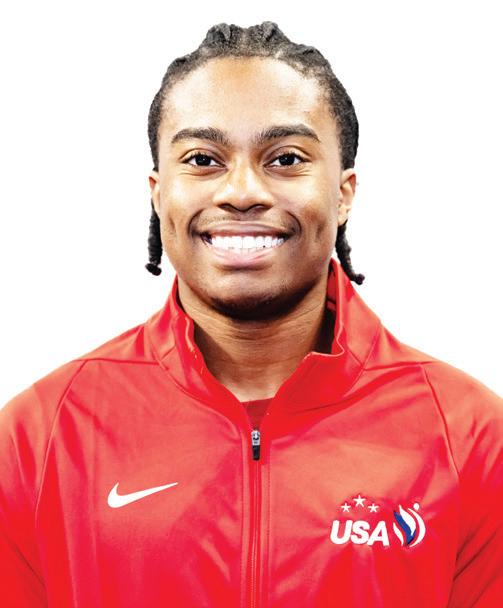

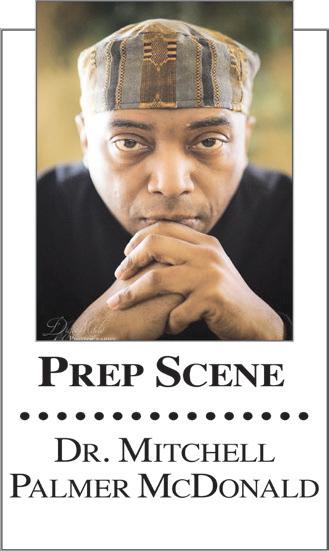
d Prohofsky and Frank Hentges definitely made their mark in Minneapolis Public Schools and City Conference, Prohofsky as a coach, teacher and administrator, Hentges as a teacher and coach. Besides the students, teachers and colleagues, each had an impact outside the classroom as well.
On Saturday, February 18, 1989, Minneapolis Roosevelt, coached by Hentges, hosted St. Paul Cretin Derham Hall in the Twin City girls basketball game at Washburn High School. I was a 23-year-old sportswriter in my second year at Insight News and very excited about covering the game. There was one problem though. After identifying myself as a reporter to cover the game, I was denied entrance because my name was not on the pass list.
My frustration quickly mounted as myself and Washburn Athletic Director Gary Stenerson were at an impasse.
Things changed when I spotted a gentleman sitting quietly in the stands. That gentleman was Prohofsky, the Minneapolis City Conference athletic director at the time.
“If you go to Ed,” I said, “he will vouch for me.” Stenerson calmly went over to Prohofsky and moments later both waved me in.
Along with the capacity crowd I watched Roosevelt— behind the outstanding play of Kim Carpenter, Angelique Brittain, Cindy Hovet, Jenny Hanson, Carita Goines and Katrina Wheeler—score a 48-46 victory over the 13thranked Raiders. Prohofsky, who recently passed away at the age of 90, led Minneapolis Marshall University—with Ronnie Henderson, Rodney Hargest, Steve Newby, Jim Ludgate, and Ronnie Hadley—to the 1976 Class A boys state basketball title. He went on to hold coaching positions at Golden Valley Lutheran College, Hamline University, Macalester College, Minnesota Lynx and Minnesota Timberwolves. He retired in 2009.
Hentges, who passed away a few weeks ago at 81 years old, went on to have an outstanding coaching career.
After the 1988-89 season concluded, Hentges, with all five starters returning for the 1989-90 campaign, took over the boys program at Roosevelt.